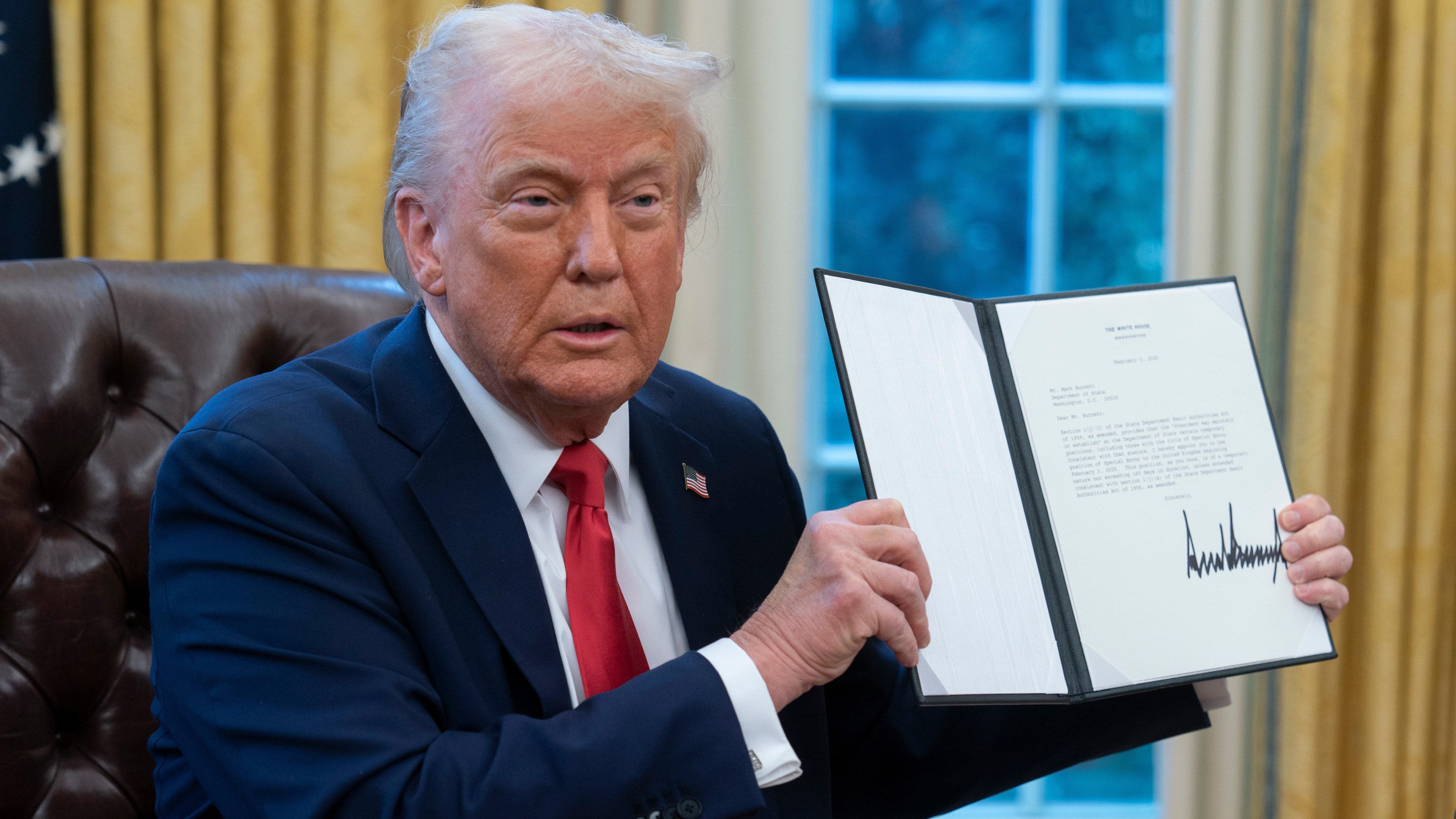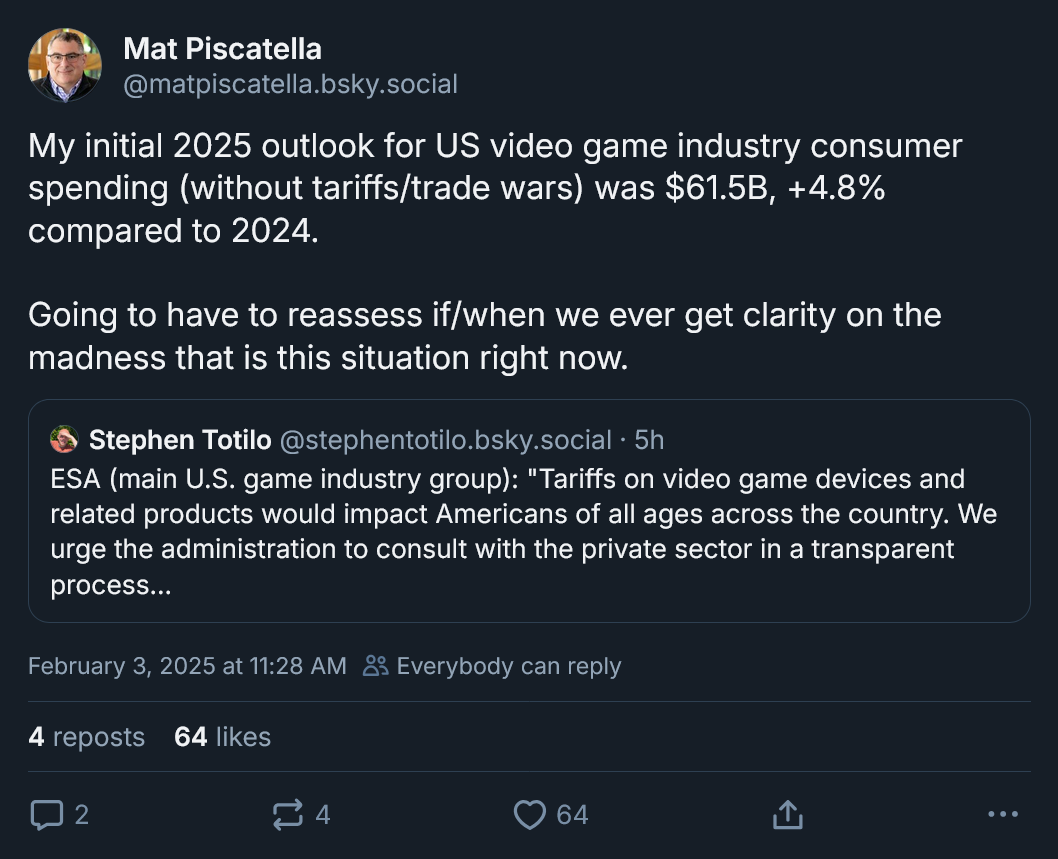Gaming's largest lobbying group says Trump's tariffs 'would negatively impact hundreds of millions of Americans' and do serious damage to the videogame industry
The ESA doesn't seem to sure what to do about it, though.

The US government is set to launch a massive, sweeping trade war against Canada, Mexico, and China tomorrow (although Mexico earlier today was given a one-month reprieve), which has the potential to throw international economies into chaos, destabilize world security, and make videogames more expensive. In response, the Entertainment Software Association, the trade group representing videogame publishers in the US, has issued a statement saying the move is likely to do serious harm to the game industry and gamers alike.
"Videogames are one of the most popular and beloved forms of entertainment for Americans of all ages," the ESA said. "Tariffs on videogame devices and related products would negatively impact hundreds of millions of Americans and would harm the industry’s significant contributions to the US economy. We look forward to working with the Administration and Congress to find ways to sustain the economic growth supported by our sector."
Videogames themselves are largely distributed digitally these days, especially on PC, and so are mostly exempt from the tariffs. But videogame hardware—the PCs, consoles, and peripherals we use to actually play those games—is not, and the impact on prices could be significant. We said last week that if US president Donald Trump follows through on his threat to place tariffs possibly as high as 100% on chips coming from Taiwan, "an RTX 5090 for $2,000 will seem cheap" in the aftermath.
Even a lower rate, like the 25% planned tariffs on products originating from Canada and Mexico, would result in a serious bump. Trump said when he announced the proposed tariffs on incoming chips that manufacturers like Nvidia and AMD are "not gonna wanna pay a 25, 50 or even a 100% tax" on imported goods, but the reality is they won't: They'll just attach the increased costs to the product price and let consumers eat it.
And there is a lot of money on the table. The ESA said in January that "total videogame sales" hit $58.7 billion in 2024; most of that was "videogame content," but hardware and console sales accounted for $4.9 billion (down from $6.5 billion in 2023) while access sales grew from $3 billion to $3.2 billion. What happens in the current environment is anybody's guess: Even if the tariffs are eventually walked back, the uncertainty left in their wake will almost certainly have a chilling effect on the industry.
"My initial 2025 outlook for US video game industry consumer spending (without tariffs/trade wars) was $61.5B, +4.8% compared to 2024," Circana (formerly NPD) executive director Mat Piscatella said on Bluesky. "Going to have to reassess if/when we ever get clarity on the madness that is this situation right now."

Unfortunately, the ESA said nothing about how exactly it proposes to address the problem, perhaps because there is no addressing it. Along with launching military action against Mexico, annexing Greenland, and denying the existence of trans people, initiating a trade war with the rest of the planet is one of the Trump administration's tentpole ideas, and given the utter lack of a rational justification for it, it seems unlikely that rational responses are going to add up to much.
The biggest gaming news, reviews and hardware deals
Keep up to date with the most important stories and the best deals, as picked by the PC Gamer team.
Ironically, just hours before the tariffs were set to start, Trump changed his mind—temporarily, at least—and "paused" their implementation for 30 days. The ESA declined to comment.

Andy has been gaming on PCs from the very beginning, starting as a youngster with text adventures and primitive action games on a cassette-based TRS80. From there he graduated to the glory days of Sierra Online adventures and Microprose sims, ran a local BBS, learned how to build PCs, and developed a longstanding love of RPGs, immersive sims, and shooters. He began writing videogame news in 2007 for The Escapist and somehow managed to avoid getting fired until 2014, when he joined the storied ranks of PC Gamer. He covers all aspects of the industry, from new game announcements and patch notes to legal disputes, Twitch beefs, esports, and Henry Cavill. Lots of Henry Cavill.

